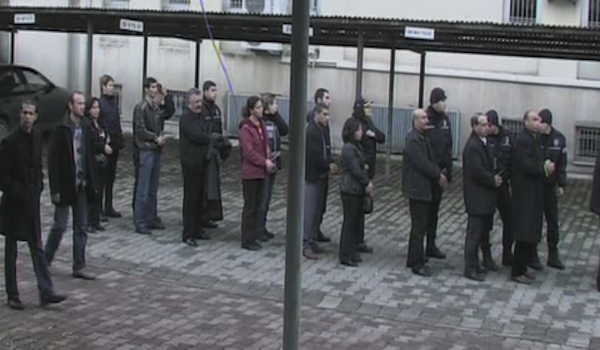 AMED, — The trial of Kurdish democratically elected politicians, known as KCK (Kurdish Communities Union) trial will resume tomorrow, Tuesday, in the Kurdish capital Amed (Diyarbakir).
AMED, — The trial of Kurdish democratically elected politicians, known as KCK (Kurdish Communities Union) trial will resume tomorrow, Tuesday, in the Kurdish capital Amed (Diyarbakir).
International observers are expected to be present at the hearing. Thousands of Kurdish politicians and activist have been detained in the past two years under the KCK operation.
The defendants’ lawyers have boycotted the hearings when the Court did not allow the defendants to present their statements in Kurdish language.
In a series of police operations beginning on 14 April 2009 and referred to in the press as the “KCK operation”, 151 people were detained on the basis of alleged links to illegal organizations. These people included lawyers, mayors, politicians, trade unionists, and human rights activists, and were recently brought to trial together in Amed, Turkey.
As the KCK is alleged to be the civil/political wing of the outlawed group and is, therefore, also an illegal organization. Members of the pro- Kurdish Peace and Democracy Party (BDP) have been accused of being members of these illegal organizations. Only 15 days after the party’s significant gain in the March 2009 local elections, where it won 50 municipalities, mass raids were carried out at the homes, businesses and offices of mayors, party activists, human rights advisors, lawyers and many others, pursuant to the KCK operations.
The subsequent trial relating to the KCK operations began on 18 October 2010 at the Special State Penal Court. By the time the trial began many of the defendants had been in custody for a period of 18 months. Much of the evidence had apparently been gathered from wiretapping and phone bugging, and there was a lack of clarity regarding the exact charges, and the basis for such charges, against each defendant.
The trial is significant for the individual defendants, with each facing possible jail sentences of 15 years-to-life if found guilty. Further, the timing of the arrests has led many observers to question the state of democracy in Turkey. The number of defendants, their prolonged detention, the questionable means of collecting evidence, as well as the Court’s attitude towards the use of the Kurdish language in the trial, has fanned fears that the accusations are politically motivated rather than based on violations of the law. Therefore, the trial is of a wider significance in terms of the implications it raises regarding democracy in Turkey and the state’s attitude towards a political resolution of the Kurdish question.